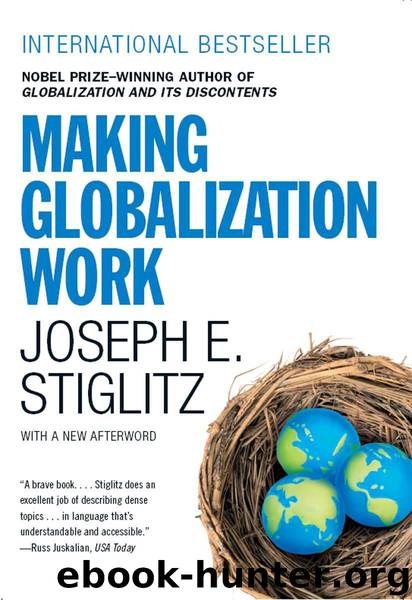Making Globalization Work by Stiglitz Joseph E

Author:Stiglitz, Joseph E. [Stiglitz, Joseph E.]
Language: eng
Format: mobi
Publisher: Norton
Published: 2007-09-16T16:00:00+00:00
What, then, is the advantage? It avoids setting national target levels. The reason that setting target levels is so difficult is that each country’s circumstances differ. The United States might claim that, because distances within the country are greater and GDP higher, it should be allowed to pollute more. France might claim that, because its pollution rate per capita is already one-third of the United States’, it is unreasonable to demand that it should cut its emissions any further. The developing countries claim that since they are poor and racing to catch up with the living standards of the developed world, it is difficult for them to reduce emissions.
Setting target levels is so contentious because allowing a country high emission levels is tantamount to giving it money—a fact that has become more obvious with the advent of carbon trading. As I have noted, countries that exceed their reduction targets can sell the excess (the amount of pollution they are allowed to generate but don’t) to countries that have fallen short. A higher emissions target (that is, a target involving a smaller reduction) means that a country either has more emission rights to sell or has to pay less to other countries to compensate for its shortfall.
Under the common tax proposal, all of these issues are avoided. Each country would keep the revenue it receives from the tax, rather than having to give the money to another country. As a result, the costs of pollution reduction are relatively small. In fact, the country as a whole might be better off; it can use the revenue from the carbon tax to reduce other taxes, such as those on savings, investment, or work. These lower taxes would stimulate the economy, with benefits far greater than the cost of the carbon tax. This is consistent with a general economic principle: it is better to tax things that are bad (like pollution) than things that are good (like savings or work).23
Of course, the energy industries in almost every country will not like this. All companies prefer getting a subsidy, which is what allowing countries the unfettered right to pollute amounts to. I do not want to suggest that it will be easy to overcome the weight of the energy-producing and energy-using lobby. It may only be possible under the threat of the kinds of trade sanctions described earlier.
Download
This site does not store any files on its server. We only index and link to content provided by other sites. Please contact the content providers to delete copyright contents if any and email us, we'll remove relevant links or contents immediately.
| Accounting | Economics |
| Exports & Imports | Foreign Exchange |
| Global Marketing | Globalization |
| Islamic Banking & Finance |
50 Economics Classics by Tom Butler-Bowdon(2140)
Six Billion Shoppers by Porter Erisman(2048)
Why Nations Fail: The Origins of Power, Prosperity, and Poverty by Daron Acemoglu & James Robinson(1859)
No Time to Say Goodbye(1820)
The Economist [T6, 22 Thg9 2017] by The Economist(1699)
Red Notice by Bill Browder(1672)
Currency Trading For Dummies by Brian Dolan(1605)
Thank You for Being Late by Thomas L. Friedman(1502)
Bitcoin: The Ultimate Guide to the World of Bitcoin, Bitcoin Mining, Bitcoin Investing, Blockchain Technology, Cryptocurrency (2nd Edition) by Ikuya Takashima(1466)
Amazon FBA: Amazon FBA Blackbook: Everything You Need To Know to Start Your Amazon Business Empire (Amazon Empire, FBA Mastery) by John Fisher(1341)
Coffee: From Bean to Barista by Robert W. Thurston(1242)
The Future Is Asian by Parag Khanna(1227)
The Great Economists by Linda Yueh(1224)
Pocket World in Figures 2018 by The Economist(1188)
Capitalism Without Capital: The Rise of the Intangible Economy by Jonathan Haskel(1176)
How Money Got Free: Bitcoin and the Fight for the Future of Finance by Brian Patrick Eha(1152)
Grave New World by Stephen D. King(1151)
The Sex Business by Economist(1132)
Cultural Intelligence by David C. Thomas(1047)
